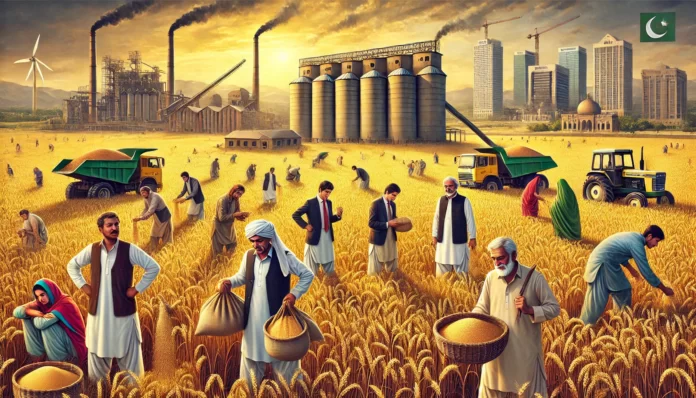As wheat harvesting peaks in Punjab and Sindh, the country’s wheat sector finds itself at a crossroads, with conflicting views over government intervention and deregulation. The flour milling industry is calling for a market-driven approach to the wheat supply chain, which it believes could unlock the full potential of the sector and benefit all stakeholders, from farmers to consumers.
Majid Abdullah, President of the Progressive Flour Millers Group, voiced strong support for the deregulation of wheat markets, stressing that the government should step back from direct involvement in price setting.
He explained that deregulation would allow market forces of supply and demand to determine prices, improving efficiency and fostering sustainable growth within the sector.
However, Pakistan’s current wheat procurement system, which dates back to the 1950s, has been criticised for its fiscal unsustainability and the increasing burden of subsidies, alongside allegations of favouritism in the distribution of wheat and gunny bags.
Despite these calls for reform, the Punjab government continues to implement price controls, including a Rs3,000 price cap per 40kg in wholesale markets, a move which has raised concerns among private sector stakeholders.
Abdullah also pointed to the disruptions caused by the Punjab government’s sudden cessation of wheat procurement activities and the federal government’s failure to announce a minimum support price, which led to wheat prices dropping from Rs3,900 to Rs2,200 per 40kg.
In Lahore, the debate over wheat procurement became a political flashpoint. Khalid Khokhar, President of the Pakistan Kisan Ittehad, expressed frustration with the government’s handling of the agricultural crisis.
At a press conference, Khokhar accused the government of neglecting farmers and announced plans for a protest, including reducing wheat cultivation in the coming year. He rejected the Punjab government’s aid package, claiming that it had done little to address the root problems of the sector.
Khokhar also criticised the politicisation of the issue, pointing out that while the PML-N government in Punjab was under fire, similar issues were occurring in other provinces under the control of the PPP and PTI.
In response, Punjab’s Minister for Agriculture and Livestock, Syed Ashiq Hussain Kirmani, defended the government’s actions, highlighting the record budget allocation for farmers, subsidies on key agricultural inputs, and interest-free loans through the Kissan Card scheme.
Kirmani also detailed the government’s initiatives to empower the private sector, including interest-free loans worth Rs110 billion to flour mills and private companies, and a mandate for mills to purchase 25% of the wheat stock.
The government also implemented Electronic Warehouse Receipts (EWR) to help farmers store their wheat and access immediate cash through bank loans, and it amended the Food Grains Licensing Control Order 1957 to ensure 25% wheat procurement by flour mills.
Despite the government’s efforts, the dispute over wheat procurement, pricing, and market regulation continues to divide stakeholders, with some pushing for deregulation and others advocating for continued government intervention to safeguard farmers’ interests.




